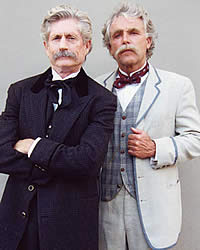Inventing the West
Inventing the West: the Dangerous Friendship of Mark Twain and Bret Harte tells the story of the two famous writers, one of whom is now regarded as an American Classic and the other relegated to the margins.

Twain and Harte met in 1864 when Twain left Nevada, under threat of a duel, and accepted a disagreeable job as reporter for a San Francisco newspaper. At that time Harte was the more established writer and Twain sought his editorial help. Harte quickly recognized Twain’s rough comic genius and was instrumental in helping him polish his style for “respectable” publications. The two remained friends for over ten years. After they collaborated on a play that flopped in New York, Twain began saying scandalous things about Harte’s character and attacking his writing. The men never met again and Harte never responded directly to any of Twain’s accusations. The vehemence of Twain’s assaults has never been explained by scholars. It remains a mystery. Inventing the West takes this mystery as its subject.
Synopsis
It is 1902 and Harte, now an old man, is examining his life and wondering if some of Twain’s accusations are right. He summons Twain to the courtroom of his mind to prosecute the trial. And so begins a journey of accusation, cooperation, recrimination, and self-discovery. Old wounds and triumphs are brought to light as the audience experiences the peaks of both writers’ careers.
Performance History
Inventing the West premiered at the California History Theater Festival produced by Duende at Sonora’s Stage 3 Theater in July, 2002. Thomas F. Maguire played Bret Harte and Randy Maple was Mark Twain. AuthorRick Foster directed.
A reading was produced for professional scholars of Twain and Harte in January, 2003. This led to the original production being invited to the Mark Twain Center at Elmira College in Elmira, New York, in November, 2003. Prior to the Elmira tour, four public and three high school performances were given in Calaveras and Tuolumne Counties (October 24-November 1, 2003).
Age Recommendation
Suitable for high school students and adults.
Technical Requirements
- Requires a theater with light and sound system.
- Theater must provide light operator, sound operator, box office and house management.
Reviews and Background
Two Program Notes by author/director Rick Foster
GARY LINEHAN, Sonora Union Democrat, 7/11/2002
Twain and Harte Live Again
“I detest him, because I think his work is ‘shoddy.’ His forte is pathos but there should be no pathos which does not come out of a man’s heart. He has no heart, except his name, and I consider he has produced nothing that is genuine. He is artificial.”So said Samuel Clemens, more widely known as Mark Twain, in an 1895 interview about his former friend and mentor, fellow 19th century author Francis Bret Harte.
The crumbling of that relationship is the subject of a new drama by Sonora playwright Rick Foster, whose “Inventing the West: The Dangerous Friendship of Mark Twain and Bret Harte” received its world premiere July 4 and continues only through Sunday at Stage 3 Theater, 208 S. Green St. in Sonora.
The play is the final offering of the first California History Theater Festival presented by Duende: Drama & Literature.
In short, it’s a stellar accomplishment, a gripping psychological tug-of-war between two literary giants whose writings defined America’s view of the West.
The two started out as friends – with the better established Harte even editing Twain’s early works – and ended as bitter enemies for reasons that are not historically clear.
Twain was extremely vocal in his contempt, while Harte never publicly addressed the split.
Foster brings the two together in an imaginary setting in winter 1902, the year of Harte’s death. The place, according to the program, is “London, Bret Harte’s Study, and the Vast Fields of Memory.”
Harte, looking back on his life, conjures up Twain’s image in an attempt to make sense of his estranged friend’s vitriol. The personal slanders he can bear, but calling his work shoddy requires more justification.
Harte then proposes that the proceedings take the form of a trial, with Twain the prosecutor and Harte the defendant – and final judge.
From there unfolds a fascinating history as well as great human drama. Though Twain’s words against Harte are often quoted, the man in Harte’s study is more congenial, even reflective of his own former statements.
Viewers learn of the origin of the friendship, how each man’s life evolved, their triumphs and failures, their personal shortcomings, their views on the grand scheme of life.
There are also extended quotations from “Huckleberry Finn,” “The Celebrated Jumping Frog of Calaveras County,” and Harte’s poetry.
A measure of the play’s success is that all of this must be conveyed by two actors in a 90-minute stretch with no intermission. Given the depth of the material one might assume a certain dryness, yet Foster has crafted an intriguing tale that lapses neither in content nor delivery.
Hats go off to actors Randy Maple and Thomas F. Maguire, who respectively play Twain and Harte.
Each is responsible for volumes of dialogue, to say nothing of the emotion they must channel into their characters.
It’s a remarkable achievement, worthy of encore performances in years to come.
Rick Foster directs, with costumes by Gail Russell. Ron Madonia designed the lights and the simple yet evocative set.
Availability and Pricing
Please contact Duende regarding production or performance rights for this play.
